Distributor Timing Off Symptoms And Likely Causes
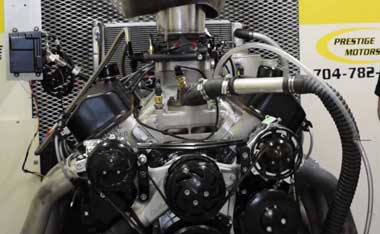
If you’re having trouble starting your car, your distributor might have a problem. A distributor is a component of the ignition system that helps spark the fuel into the cylinders.
If it’s not working properly, the engine may not be able to start. A faulty distributor can cause weird symptoms like intermittent sputtering or misfiring in some cases.
Bring your car in for a diagnostic checkup if you think your distributor might be the issue. This article will discuss everything about distributor timing off symptoms.
Distributor Timing Off Symptoms
Distributor timing off symptoms could mean a few things. One possibility is that the distributor is reaching its end of life and needs to be replaced.
Another possibility is that the timing belt has become stretched or worn and needs to be replaced. In either case, replacing the distributor would resolve the issue.
1. Oil leaking
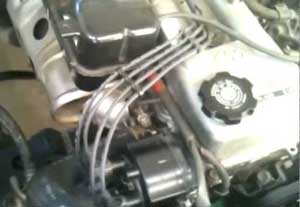
Oil leaking could mean that there’s a leak in one of the engine’s oil seals or pipes. This can result in a buildup of oil and sludge in the engine, which can cause serious problems like engine misfires, the engine won’t turn, or even total engine failure. Repairing or replacing the seal or pipe would correct the issue in most cases.
2. Engine misfires
Engine misfires could indicate that there’s something wrong with one of the engine’s valves or pistons.
This may be caused by sticking valves, defective piston rings, or other issues. Repairing or replacing these parts would usually rectify the problem.
3. Engine won’t turn
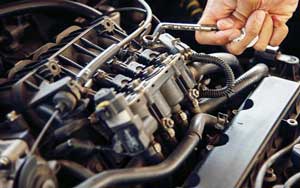
Engine won’t turn could be caused by a variety of problems, including a bad fuel pump, faulty steering gear, or failed differential bearing.
Repairing any of these parts would usually fix the issue and restore normal operation to the vehicle.
4. Ticking noise
A ticking noise could be a sign that the engine’s timing belt has gone bad. When the belt slips, it makes a clicking sound.
This noise can be extremely troublesome and typically indicates that other components in the engine are also failing. In most cases, replacing the belt would resolve the issue.
Distributor Timing Adjustment
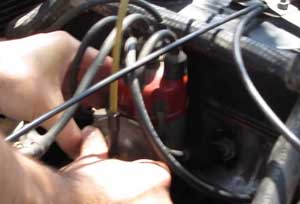
This can depend on a number of factors, including the type of distributor housing you have and whether or not it has a manual or automatic timing adjustment feature.
If your distributor housing has a manual timing adjustment feature, you will need to turn it in the opposite direction to adjust the timing.
Suppose your distributor housing does not have a manual timing adjustment feature. In that case, you will need to contact the manufacturer or distributor to inquire about the availability of a timing adjustment product.
Ignition Timing Too Advanced Symptoms
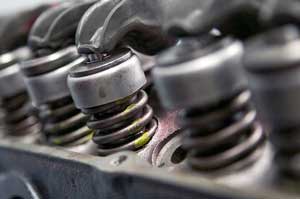
If you are experiencing any of the following symptoms, it may be time to have your ignition timing changed: increased fuel consumption, low power, overheating, hard starting, or pinging/knocking.
Having your ignition timing changed can alleviate these issues and improve your vehicle’s performance.
- Fuel consumption: If your engine is consuming more fuel than usual, it may be time to adjust your ignition timing.
- Low power: If you are struggling to get your engine started, it may be time to adjust your ignition timing.
- Overheating: If your engine is overheating, it may be time to adjust your ignition timing.
- Hard starting: If your engine is difficult to start, it may be time to adjust your ignition timing.
- Pinging/knocking: If your engine is knocking or pinging, it may be time to adjust your ignition timing.
Ignition Timing at Idle
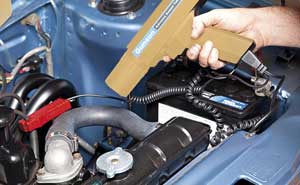
If you are having difficulty starting your car, it may be time to check your ignition timing. The timing refers to the number of degrees the spark plugs fire at when the engine is idle.
The optimal timing is 6 to 10 degrees but can be adjusted depending on the engine and driving conditions.
A too-tight timing will cause the piston to hit the top of the cylinder too early, resulting in compression problems and poor performance.
A too-loose timing will cause the piston to hit the bottom of the cylinder too late, resulting in excessive backfire and decreased fuel economy.
Symptoms of Bad Engine Timing
If you are experiencing any of the following symptoms, it may be time to have your engine timing checked:
Revs start acting up
This could be indicative of an issue with the timing belt, camshaft, or crankshaft.
Exhaust issues
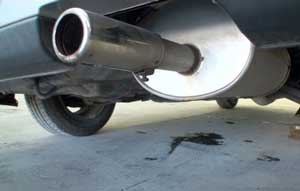
If your engine is timing off, it is likely that the air/fuel mixture is not being properly burned. This can cause the exhaust to smell bad and may result in a loss of power and RPMs.
Oil leak near the motor
If you are noticing a significant increase in oil consumption or if there is a black film on the surface of the engine, this could be an indication of an issue with the engine timing.
Engine won’t turn over
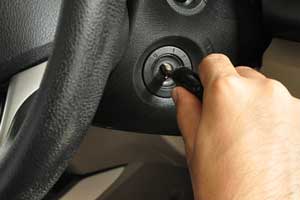
If the engine just doesn’t turn over, this could be indicative of an issue with the engine timing.
Ticking noise
If you are hearing a constant clicking or ticking noise coming from the engine, this could be an indication of an issue with the engine timing.
Cam Timing Off Symptoms
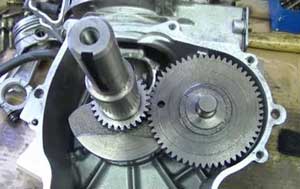
A number of things can cause cam timing off symptoms, but the most common culprit is a slipping camshaft.
When this happens, the cam lobes (the metal pieces that rotate the cam) can lose contact with the camshaft, causing the engine to run rough or not at all. In some cases, this may be the only sign that a cam timing off is occurring.
When you have a cam timing off, your car will either be running rough or not at all. Suppose you are experiencing any of the following cam timing off symptoms.
In that case, it may be time to have your car checked out by a technician: a rough idle, no power, knocking or sputtering when starting, and difficulty accelerating.
Each of these symptoms can be indicative of a number of issues, from a faulty cam timing belt to an issue with the engine itself.
If you are unsure whether your car needs to be serviced, it is best to bring it in for a diagnostic scan. A technician will be able to identify the issue and recommend the best course of action.
What Happens If Your Distributor Timing Is Off
If your distributor timing is off, it can lead to a number of problems, including reduced power, overheating, increased fuel usage, hard to start, knocking, and oil leak.
Reduced power can be caused by a lack of fuel, which in turn can lead to a lack of power and, ultimately, a failure.
Overexerting the engine can also lead to reduced power and overheating. Overheating can cause the engine to wear out faster, while knocking can be a sign that the engine is not correctly timed or that there is a problem with the fuel system.
An oil leak can occur if the engine is not keeping up with the demand for oil, which can lead to engine failure.
It is important to contact your distributor as soon as you notice any of these problems so that they can be corrected as quickly as possible. By taking action early, you may be able to prevent further damage and/or loss of life.
What Causes Engine Timing To Be Off
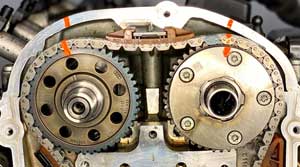
A few different things can cause engine timing to be off, including a loose or weak engine timing belt, timing is out, Too lean a fuel mixture, Too rich fuel mixture, or too fast an idle speed.
A loose or weak engine timing belt can cause the engine to over-rev, which can cause the timing to be off.
Timing is out can be caused by a broken timing chain or sprocket, while Too lean a fuel mixture can be caused by a carburetor that is not adjusted correctly or a fuel injector that is not set to the correct setting.
Too rich a fuel mixture can be caused by adding too much fuel at once or by overfilling the engine with fuel. Finally, too fast an idle speed can be caused by a dirty air filter or a worn spark plug.
How Far Off Can Timing Be
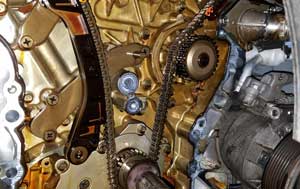
Engine timing may be off by up to 12 crankshaft degrees (2 spark events), and the engine will still function.
The ’05+ Third Generations, on the other hand, detect the position of the camshafts and will shut down if they are more than 12 crankshaft degrees off. Each cam has a little notched wheel on it, which is how the mechanism works (they are plastic).
There is an optical sensor positioned in such a way that it can see these notches as they pass by—how Ford managed to put them as part of the oil pump’s backplate is a mystery.
The crank sensors provide the computer with 6 crankshaft positions, one for each cylinder and one for each camshaft, while the camshaft position sensors provide the computer with 12 camshaft positions (CPS).
Diesel Engine Timing Off Symptoms
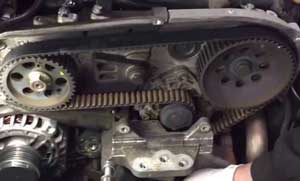
Some of the most common diesel engine timing off symptoms include reduced power, overheating, increased fuel usage, hard to start, knocking, an oil leak, and a ticking noise.
If you are experiencing any of these symptoms, it is important to take action and get your truck to a mechanic as soon as possible.
Reduced power can be caused by a variety of issues, including incorrect timing, misfires, or clogged fuel filters.
Overheating can be caused by a number of things, including clogged air filters or excessive oil consumption.
Increased fuel usage can be the result of problems with the engine, fuel system, or transmission. Hard starting can be the result of a number of issues, including worn-out parts, dirty engine oil, or insufficient fuel.
Knocking can be the result of worn or loose parts in the engine, and an oil leak can cause the lubricant to seep into the engine and cause knocking.
What happens if valve timing is incorrect?
First and foremost, incorrect valve timing causes a decrease in engine performance. The valves regulate the amount of fuel and air entering the combustion chamber.
Incorrect valve timing can also cause an engine to suffer from poor efficiency. This can mean the engine consumes more fuel than it should, meaning you’ll have to refuel much more frequently or deal with a rapidly diminishing fuel tank.
Another serious problem caused by incorrect valve timing is a phenomenon known as “valve float.”
Finally, incorrect valve timing can lead to a loss of engine reliability and longevity. Because the valves are not properly synchronized, it can cause the engine to experience increased wear and tear, leading to a gradual loss of power and a decrease in overall performance.
How to check engine timing
Here’s a guide to checking engine timing in five easy steps:
1. Run a Diagnostic Test
The first step in checking engine timing is running a professional diagnostic test. This will tell you whether or not the engine is in good shape.
2. Inspect the Timing Belts
Next, check the timing belts to make sure they are not worn or frayed. If they are, they will need to be replaced.
3. Inspect the Timing Chain
The timing chain is the “chain” that runs between the crankshaft and the camshaft and is responsible for properly timing the engine. It’s important to ensure it is not stretched excessively, as this can interfere with the engine’s timing.
4. Remove the Spark Plug Cable
When you have confirmed the condition of the timing belt and the timing chain, you can now remove the spark plug cable from the distributor.
5. Adjust the Timing
The final step is adjusting the timing of the engine. This is done by rotating the distributor until the mark on the crankshaft lines up with the dial on the distributor.
Does advancing timing lean or rich
Lean timing means the engine’s ignition spark is initiated earlier than normal. A lean-timed engine requires less fuel, as fuel delivery is initiated with the spark, and thus provides a better fuel economy.
On the other hand, if you decide to advance the timing to a rich setting, you̠r engine ignition spark is delayed.
Does advanced timing cause detonation?
Yes. Detonation is a common issue for engines with advanced timing, it can be seen through louder engine noise or even a complete engine failure. Understanding the consequences of advanced timing and the importance of correctly setting it correctly is essential to avoid catastrophic engine failure.
Can timing cause knocking?
The answer to that question is yes. When the timing of an engine’s cylinders is out of sync, it can produce a knocking or pinging sound. This is caused by premature fuel detonation before the spark plug can ignite it, causing a jarring sound completely.
What happens if valve timing is incorrect?
However, the most serious consequence of incorrect valve timing is the potential for major engine damage. When the valves are out of sync, the engine may suffer from pre-ignition, backfiring through the intakes, or other irregular combustion events.
These events often result in a build-up of carbon deposits that can cause pressure to build up in the cylinders and eventually cause it to blow a gasket or the head gasket, leading to the need for an expensive rebuild or, worse, an engine replacement.
Frequently Asked Questions
1. What are the symptoms of timing being off?
The most common symptoms of timing being off are reduced power, overheating, increased fuel usage, hard to start, knocking, and an oil leak.
If one or more of these symptoms are present, it is recommended to get your truck to a mechanic as soon as possible.
3. What are the symptoms of incorrect ignition timing?
If you’re experiencing any of the following symptoms, it may be time to take your car in for an inspection and replacement of the ignition timing.
Incorrect ignition timing can reduce power output, increase fuel consumption, cause excessive engine heat, and difficulty starting. In some cases, it may also result in knocking or pinging.
4. How do you fix a distributor timing?
This can be a difficult issue to fix, as a variety of factors may cause it. One common issue is that the distributor timing may be out of adjustment.
This can be due to worn or incorrect gears, which can then cause the distributor housing to turn in one direction or the other. In some cases, the distributor timing may even be damaged.
5. What happens when timing is too advanced?
When the timing is excessively advanced, the combustion mixture exerts a force on the piston, causing the engine to fail.
A variety of variables might contribute to this, including an improper air/fuel combination, worn or broken piston rings, and wrong timing.
The most prevalent cause of engine failure is an incorrect air/fuel combination in timing-related concerns.
6. How to tell if distributor is off?
Distributor failure can often be difficult to diagnose, as there are many possible causes. However, by following a few simple steps, you can often determine if your distributor is failing.
First, it is important to check the engine speed. If the engine speed is significantly lower than normal, this may be an indication that the distributor is malfunctioning.
Additionally, if the distributor fails to start or misfires, this may also be an indication of a problem. Finally, if the distributor speed is missing or timing is off, this may be an indication that the distributor is failing.
7. What happens if the timing on an engine is off?
If the timing on an engine is off, damage can occur. The cause the engine will not be able to run at its full power and can even overheat.
In addition, the engine may not be able to perform as it should due to an incorrect timing setting. This can lead to decreased fuel efficiency, decreased performance, and even engine failure.
So, if you are having any engine issues, it is important to have it checked out by a mechanic who is familiar with engines and timing.
Conclusion
After reading this blog, you now know that distributor timing adjustment is an important process to keep your engine running at its best.
You’ll also be aware of the common symptoms that suggest your distributor may need adjustment and distributor timing off symptoms, so you can get it done as soon as possible.
We hope this article has helped you understand distributor timing adjustment and put it into perspective.

![Distributor Leaking Oil-Bad or Failing Distributor O Ring [Reasons]](https://torqueadvisor.com/wp-content/uploads/2022/04/Distributor-Leaking-Oil.jpg)